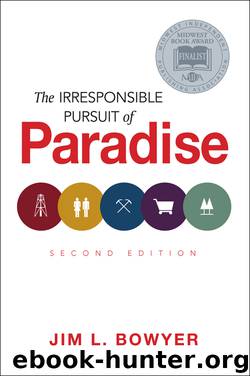The Irresponsible Pursuit of Paradise by Jim Bowyer

Author:Jim Bowyer [Bowyer, Jim L.]
Language: eng
Format: epub
ISBN: 978-0-9976726-2-6
Publisher: Levins Publishing
Published: 2017-04-08T04:00:00+00:00
The Role of Forest Plantations
Forest plantations generally produce much more wood per geographic area than natural forests because they are usually established on highly productive sites, intensive silviculture (sometimes including fertilization) is practiced, and genetically-selected growing stock is used. Wood production in these plantations ranges from two to five times that of an equal area of natural forest, and in some cases can be as much as 10 times greater than surrounding forests. Plantations will clearly play a significant role, and perhaps even a dominant role, in providing future wood supplies.
The area of plantations worldwide was estimated at 687 million acres (278 million ha) in 2015, comprising about seven percent of the total forest area worldwide. Over the period 2010–2015, plantations increased at a rate of about 54 million acres (22 million ha) annually. Almost half of the world’s forest plantations are currently located in Asia, primarily East Asia including China, where plantations account for over 35 percent of its forests. Globally, about three-fourths of forest plantations are located in Asia, Europe, and North America.
Plantation forests have been established around the world to provide industrial wood (industrial plantations), fuelwood, and natural rubber. Planted forests are sometimes also established to provide soil and water conservation and protection from wind erosion.
Fast-growing industrial wood plantations cover 134 million acres, accounting for a little over 20 percent of the total plantation area and just 1.3 percent of total forest coverage worldwide. Yet, these plantation forests satisfy about one-third of global consumption of industrial wood, a number that is expected to increase over time.
In addition, there are approximately 20 million acres of fuelwood plantations in the world, with most of these in Asia. The gathering of wood for use as fuel is a cause of increasing concern. In fact, this use is growing faster than world population. Specifically, consumption of fuelwood increased 250 percent between 1960 and 2012, a period in which world population increased by 90 percent. Plantations of fast-growing tree species provide a way to reduce pressures on natural forests while providing a source of sustainable fuelwood supply.
Despite the great promise of intensively-managed plantations for providing needed volumes of wood, considerable controversy exists. One of the controversial aspects of plantations is the clearing of natural forests to make way for plantations. Controversy is also rooted in perceptions of low biodiversity of plant and animal species in planted forests compared to natural forests, common use of non-native tree species in plantation establishment, long-term forest health risks associated with limited genetic variation in planting stock, and land ownership issues.
Download
This site does not store any files on its server. We only index and link to content provided by other sites. Please contact the content providers to delete copyright contents if any and email us, we'll remove relevant links or contents immediately.
The Lonely City by Olivia Laing(4796)
Animal Frequency by Melissa Alvarez(4459)
All Creatures Great and Small by James Herriot(4306)
Walking by Henry David Thoreau(3950)
Exit West by Mohsin Hamid(3822)
Origin Story: A Big History of Everything by David Christian(3680)
COSMOS by Carl Sagan(3617)
How to Read Water: Clues and Patterns from Puddles to the Sea (Natural Navigation) by Tristan Gooley(3458)
Hedgerow by John Wright(3352)
How to Read Nature by Tristan Gooley(3332)
The Inner Life of Animals by Peter Wohlleben(3303)
How to Do Nothing by Jenny Odell(3292)
Project Animal Farm: An Accidental Journey into the Secret World of Farming and the Truth About Our Food by Sonia Faruqi(3212)
Origin Story by David Christian(3192)
Water by Ian Miller(3176)
A Forest Journey by John Perlin(3066)
The Plant Messiah by Carlos Magdalena(2921)
A Wilder Time by William E. Glassley(2855)
Forests: A Very Short Introduction by Jaboury Ghazoul(2835)
